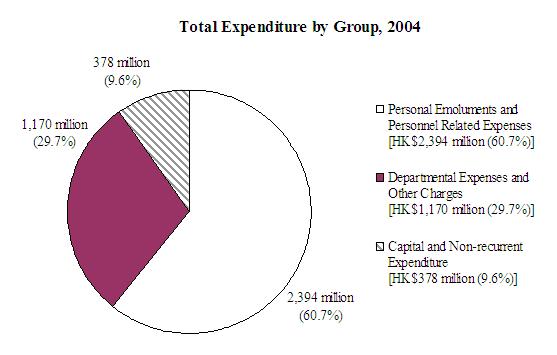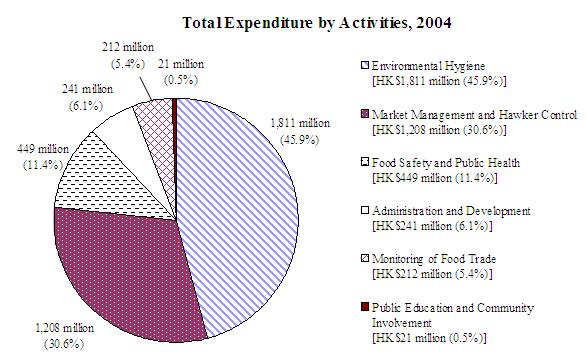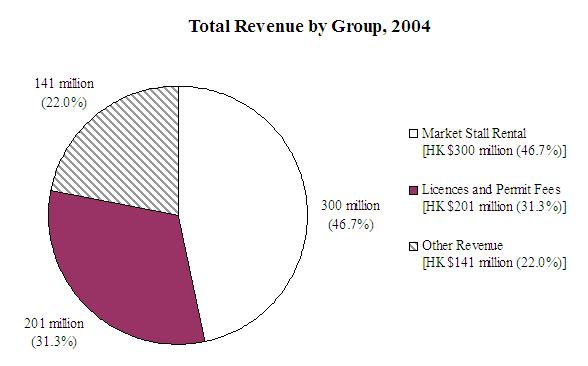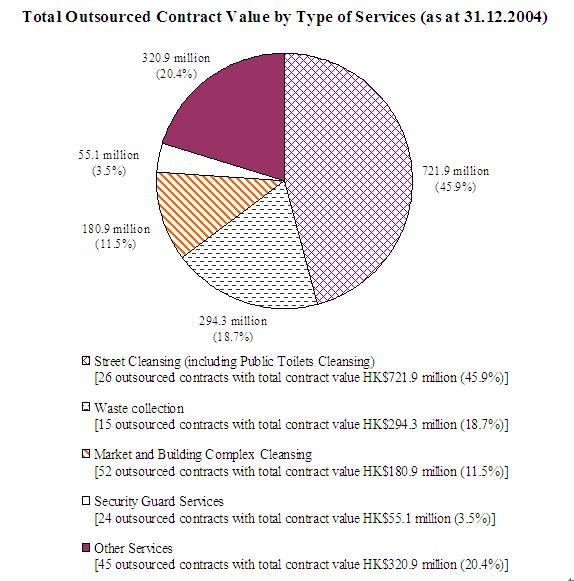The Administration and Development Branch provides various management and support services to the entire Department. These include staff management and development, financial management, information technology, planning and implementation of capital works projects, outsourcing of services, complaints management, public education and publicity on environmental hygiene and food safety.
Grade Management
There are three major grades covering Health Inspectors, Hawker Control Officers and Foreman, and two grade managers for Health Inspector and for Hawker Control Officer and Foreman grades. The grade managers are responsible for human resource management matters involving manpower planning, career development, postings, promotions and training.
The Health Inspector grade comprises six ranks - Senior Superintendent, Superintendent, Chief Health Inspector, Senior Health Inspector, Health Inspector I/II and Student Health Inspector. They are responsible for various environmental hygiene and food safety functions, for example, district hygiene, licensing, prosecution, meat inspection, cleansing services, outsourcing, pest control, hawker control, management of markets, cemeteries and crematoria, food control and health education.
The Hawker Control Officer grade comprises five ranks - Principal Hawker Control Officer, Chief Hawker Control Officer, Senior Hawker Control Officer, Hawker Control Officer and Assistant Hawker Control Officer. They are responsible for controlling on-street hawking activities, managing hawker permitted places and taking law enforcement action against illegal hawking activities. They are also empowered to take legal action against people committing cleanliness offences, such as littering and spitting.
The Foreman grade comprises four ranks - Senior Overseer, Overseer, Senior Foreman and Foreman. They are mainly responsible for supervising the work of minor staff in market management, street cleansing, waste collection, pest control and monitoring the performance of the Department's service contractors. Members of the grade can also take legal action against cleanliness offenders.
Training
Vocational and general training is provided to staff to equip them with the necessary knowledge and skills to carry out their duties, to enhance professionalism and help them gain the pre-requisite qualifications for career advancement. Staff are provided with in-house programmes and those organised by local institutes and outside Hong Kong. An evaluation system is in place to measure the effectiveness of each programme.
In-house programmes are organised to improve the functional and core competence of staff. They are mainly designed, administered and conducted by the Department's Training Section.
Local academic institutes are appointed to administer and conduct commissioned programmes. Some of these lead to the award of qualifications that are pre-requisites for career advancement. Staff members are also sponsored to attend local public programmes whose contents are highly relevant to the Department's work.
Training programmes outside Hong Kong are organised to improve skills and knowledge in functional competence, when there is difficulty in arranging these programmes locally.
Management Services
Management studies and statistical surveys help facilitate the Department in providing efficient and effective public services, in monitoring the standard of quality performance, and in formulating or revising policy.
The Management Services, Survey and Statistics Section, consists of the Management Services Unit and the Survey and Statistics Unit. The section is responsible for the provision of management consultancy studies and statistical surveys.
The Management Services Unit completed five major reviews during the year on staffing of the Supplies Section, transport support for the District Cleansing Section, manual gully cleansing, manpower for the District Cleansing Section of Central District, and the relief ratio for refuse collection vehicles.
The unit also assists departmental clients in implementing recommendations in various review reports, maintains and upgrades the bar-coding file management system to improve office efficiency, and contributes to the design of departmental forms.
The Survey and Statistics Unit completed a number of surveys in 2004 on such issues as the fixed pitch hawkers in Kam Wa Street and its vicinity, an Ovitrap survey in living quarters, health education leaflets compiled by FEHD and public toilets.
The unit compiles an annual statistical report for the Department and offers technical advice to clients on how to undertake statistical surveys and analyse the data collected.
Financial Management
Breakdown of Expenditure by Expenditure Group (Chart)
| $M | Percentage | |
|---|---|---|
| Personal Emoluments and Personnel Related Expenses | 2,394 | 60.7% |
| Departmental Expenses and Other Charges | 1,170 | 29.7% |
| Capital and Non-recurrent Expenditure | 378 | 9.6% |
Breakdown of Expenditure by Activities (Chart)
Note: Figure may not add up to total due to rounding.
| $M | Percentage | |
|---|---|---|
| Environmental Hygiene | 1,811 | 45.9% |
| Market Management and Hawker Control | 1,208 | 30.6% |
| Food Safety and Public Health | 449 | 11.4% |
| Administration and Development | 241 | 6.1% |
| Monitoring of Food Trade | 212 | 5.4% |
| Public Education & Community Involvement | 21 | 0.5% |
Breakdown of Revenue (Chart)
| $M | Percentage | |
|---|---|---|
| Market Stall Rental | 300 | 46.7% |
| Licences and Permit Fees | 201 | 31.3% |
| Other Revenue | 141 | 22% |
All matters relating to expenditure and procurement, including payment processing, financial advice and monitoring, are handled by the Finance and Supplies Division.
In 2004, the Department spent $3,942 million, including $2,394 million on salaries and allowances and personnel related expenses, $1,170 million on departmental expenses and other charges and $378 million on capital and non-recurrent expenditure.
By activities, the majority of the expenditure ($1,811 million) was spent on environmental hygiene. This was followed by $1,208 million for market management and hawker control, $449 million for food safety and public health, $241 million for administration and development, $212 million for monitoring the food trade, and $21 million for public education and community involvement.
In 2004, the Department received revenue of $642 million. Most of the revenue came from the rental of stalls in public markets managed by the Department ($300 million) and from licence and permit fees ($201 million). Other sources included fees for cemeteries and crematoria services ($65 million), fees for meat examination ($30 million) and other miscellaneous services ($46 million).
Information Technology
The Department uses information technology extensively to provide high quality services to the public. During the year, upgrading the computer system facilitating hawker licence and hawker conviction processing was completed. The new system further automates the checking of hawker licence application details, produces management reports that can correlate hawker licence and conviction records and allows convenient electronic data sharing between the operations of the urban areas and the New Territories. Test results for food samples collected from restaurants, food stalls and markets have been stored and are maintained electronically to support risk assessment and analysis of food safety issues from different aspects. As the Department administers the "Incentive Scheme for Hygiene Improvement in Food Premises" , a system has been developed to help process hygiene improvement loan applications, their corresponding draw down and monthly repayment details.
Internally, a number of IT initiatives have been completed or are in progress:
- Staff can submit, and their supervisors can approve, leave applications on-line through the Department's intranet. The intranet also serves as the gateway for appropriate staff to access Government-wide computer applications through a one-stop single log-on process.
- A computer system has been built to improve efficiency in the collection of operational data from the Department's district environmental hygiene offices across Hong Kong. Up-to-date management information can now be compiled more easily, timely and consistently.
- A computer system has been developed for recording the Department's fixed assets and for miscellaneous calculations in relation to this process.
- The operating systems of many other computers have been upgraded to improve operation reliability and security protection.
- The licence and permit system that assists processing of applications for various restaurant licences, places of public entertainment licences, liquor licences, food permits and karaoke establishment permits, is being upgraded to provide more functions and to automate more existing manual procedures to improve the efficiency of office operations.
- Upgrading the personnel management system to enhance hardware efficiency, software workflow and user interface is in progress and will be completed in 2005.
Looking ahead, the Department will continue to perfect its information technology infrastructure and computer systems, and implement information technology projects cost effectively.
Capital Works
In the Government's 2004 Capital Works Resource Allocation Exercise, the five-year allocation on food and environmental hygiene services capital projects is estimated at $1,700 million. Of the total allocation, about $1,000 million is to meet expenditure for projects under construction or completed with outstanding accounts, while $700 million has been earmarked for new projects.
Markets
A new market in a multi-functional complex in Tai Po was commissioned in September and a cooked food market in Queen Street was commissioned in October. The Tai Kok Tsui Market, which is accommodated in a multi-functional complex, is under construction. A new market in the Aldrich Bay Reclamation Area is under construction and the reprovisioning of the Wan Chai Market is underway. New shopping kiosks to replace the Stanley Temporary Market are being planned; and construction of the Mong Kok Cooked Food Market is nearing completion.
There are some 19 projects on retro-fitting air conditioning systems and general improvements to markets and Cooked Food Centres (CFCs), involving 18 markets and nine CFCs. The Government has recommended to the relevant LegCo Subcommittee to proceed with individual projects after securing an 85% or more support rate from the stall lessees concerned. Three markets and four CFCs (a total of five projects) have achieved a support rate of 85% or above to proceed with A/C retro-fitting, in addition to general improvement works. The markets and CFCs include : -
- Bowrington Road CFC
- Fa Yuen Street CFC
- Fa Yuen Street Market
- San Hui Market
- Shek Wu Hui CFC
- Yue Wan CFC
- Yue Wan Market
Work on the Bowrington Road CFC, the Shek Wu Hui CFC, the Yue Wan Market and CFC is in progress. Funding approval will be sought from the Legislative Council in early 2005 for the project at the San Hui Market, while the projects at the Fa Yuen Street Market and CFC are in the planning stage.
For the remaining 15 markets and five CFCs, which had a support rate of less than 85%, the Department has recommended to the LegCo Panel on Food Safety and Environmental Hygiene to proceed with essential improvement works in 12 of the markets and four CFCs. This will tie in with the latest building and fire safety requirements and other general improvement works.
Funding approval has been obtained and improvement works are underway for the following projects:-
- Aberdeen Market and CFC
- Bowrington Road Market
- Ngau Chi Wan Market and CFC
- Ngau Tau Kok Market and CFC
Funding approval will be sought for:-
- North Kwai Chung Market
- Po On Road Market and CFC
- Sai Kung Market
- Sheung Wan Market
- Tsuen Wan Market
- Tung Yick Market
- Wing Fong Street Market
- Yeung Uk Road Market
As the general conditions of the Kwun Chung Market and CFC, the To Kwa Wan Market and Tsuen King Circuit Market remain fair, no major improvements will be carried out at this stage.
In addition, some other markets are in line for fire services upgrading and general improvement works, which are being implemented in phases from 2002-03.
Refuse Collection Points
As part of the on-going efforts to improve the living environment, the Department continues to replace temporary roadside Refuse Collection Points (RCPs) with off-street facilities in enclosed buildings equipped with modern de-odorising installations. Construction of the RCP at Hing Shing Road in Kwai Chung, Yee Kuk Street in Sham Shui Po, Lam Tsuen in Tai Po and Penny's Bay on Lantau is in the pipeline.
Upgrading of 48 RCPs in the New Territories to improve pollution control was completed in 2004. The enlargement of the RCP at Shung Yan Street, Kwun Tong, is in progress, and planning is underway to upgrade another six village RCPs in Tai Po.
Public Toilets
New public toilets were completed in Chung Hau Tsuen on Lantau, Tai Ho Road in Tsuen Wan, Lam Tsuen in Tai Po, Kam Sheung Road in Yuen Long and Wui Cheung Road in Yau Tsim District. Construction of new public toilets is in the pipeline at the Lantau Link Viewing Platform on Tsing Yi, Sunny Bay on Lantau, To Uk Tsuen in Yuen Long, the New Wan Chai Market and the Stanley Complex in Southern District. As part of the Public Toilet Improvement Programme, 18 public toilets and aqua privies were upgraded in 2004 and improvements to a further 18 are in progress or being planned. Conversion of 100 aqua privies to flushing toilets, an initiative of the former Team Clean chaired by the Chief Secretary for Administration, is also being planned.
Cemeteries and Crematoria
The replacement of four cremators at the Fu Shan Crematorium was completed, with the new facilities commissioned in mid-October. Replacement of the six cremators at the Diamond Hill Crematorium is in progress, with works for Phases I and II scheduled for completion by June 2006 and April 2008, respectively. Planning is under way for the provision of cremators at the Wo Hop Shek Crematorium and an additional columbarium at Diamond Hill.
Outsourcing of Services
Contracts (Chart)
| Services Contracted Out | No. | $M |
|---|---|---|
| Street Cleansing (including Public Toilets Cleansing) | 26 | 721.9 |
| Waste Collection | 15 | 294.3 |
| Market & Building Complex Cleansing | 52 | 180.9 |
| Security Guard Services | 24 | 55.1 |
| Other Services | 45 | 320.9 |
By the end of 2004 162 contracts valued at $1,573.1 million were in force for the provision of services by private contractors. The outsourcing policy is aimed at greater cost-effectiveness and efficiency in the delivery of services.
Public market cleansing, street cleansing, waste collection, mechanical street sweeping, mechanical gully cleansing, building cleansing, security guard services, controlling mosquitoes in streams, animal carcass collection, cleansing and undergrowth cutting services for cemeteries and columbaria, and the collection of recyclables are examples of outsourcing services.
Measurable performance standards are written into the contracts to ensure the quality of services provided. Protective clauses have also been included in tenders to safeguard the rights and benefits of non-skilled workers. Supervisory checks are conducted to ensure compliance by contractors.
Complaints Management
The Complaints Management Section is responsible for formulating and reviewing policies on, and procedures for, handling all types of complaints. During the year , 129,309 complaints were received by the Department including 127,842 relating to the services it provides.
The section conducts independent investigations into staff-related complaints other than those concerning crime, corruption, serious misconduct and dereliction of duty. In addition to taking immediate follow-up action on the complaints and replying to complainants, the section analyses the complaints according to their type, nature and causes to enable remedial or improvement measures to be taken.
Quality Assurance
Continuous improvement is one of the priority tasks of the Department to ensure provision of quality services to the public.
The Quality Assurance Section is mainly responsible for conducting day-to-day regulatory inspections on services provided by the Department. Recommendations are made for improvements to services where inadequacies in existing operational systems, procedures and guidelines are identified. The section also recommends good performers for Quality Assurance Awards to motivate meritorious and hardworking front-line staff. In addition, the section investigates cases of dereliction of duty in an independent, objective and fair manner.
Public Education and Publicity
Public education plays an important role in almost all the Department's activities and initiatives, forming part of an integrated approach to ensuring food safety and improving environmental hygiene.
To achieve this, the Department organises publicity and educational programmes, and arranges exhibitions, outreaching programmes and seminars.
The Department operates the Communication Resource Unit at the Fa Yuen Street Municipal Services Building, 123A Fa Yuen Street, Mongkok and the Health Education Exhibition and Resource Centre in Kowloon Park, to educate the public on the importance of food safety and environmental hygiene using interactive exhibits and library materials. Group visits and guided tours are provided to schools, voluntary agencies and the public. Seminars and activities are conducted regularly. The centre attracted 167,296 visitors in 2004.
In addition, an improved outreach health education programme was launched in mid-2004 to spread general and specially selected messages about food safety and environmental hygiene.
During the year, the centre organised 1,061 talks, exhibitions and activities for kindergartens, primary schools and secondary schools, 962 talks for elderly centres, and 390 talks for new arrivals and members of the public. Audio-visual aids, question-and-answer sessions, demonstrations and games were used to enrich and enliven the learning process.
In relation to food safety, comprehensive public education programmes were organised on nutrition labelling, genetically modified food, and hazard analysis and critical control point principles. Food surveillance results were regularly released to help consumers make informed choices when buying food. "Food Safety Day 2004", an initiative focusing on food safety, was organised from July to November, and was launched with a Food Safety Roadshow. Other publicity activities included a series of six promotional television programmes on food safety, a colouring competition for primary school students, a poster design competition for secondary school students, and a series of food hygiene seminars for the food trade, foreign domestic helpers and the public.
To cater for the specific needs of the food trade, seminars on restaurant licensing were arranged on a bi-monthly basis for those who had applied for licences for food premises or were thinking of opening a food business.
On environmental hygiene, the Department launched a new publicity drive in mid 2004, which included television and radio announcements, advertisements at various road tunnel entrances, and at bus shelters and railway stations. Banners, posters and pamphlets were also produced. The key messages encouraged the public to continue keeping Hong Kong clean, and warned road users against littering from their vehicles. Anti-rodent and anti-mosquito campaigns were organised to solicit public support and participation in pest control.
The Department also provided $1.8 million to District Councils and local organisations to subsidise the arranging of cleansing activities and campaigns to encourage community involvement in keeping Hong Kong clean.









